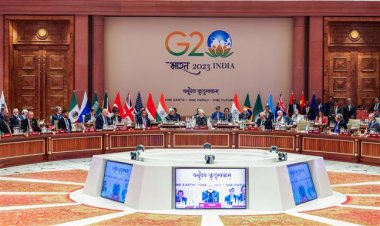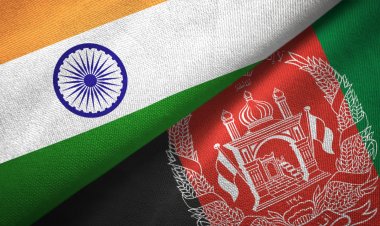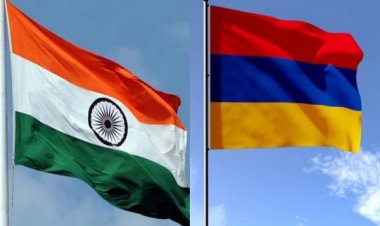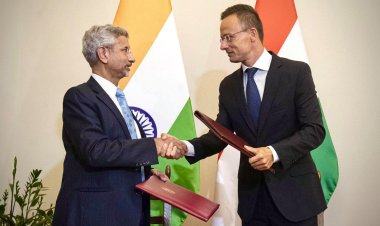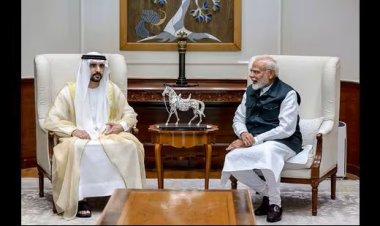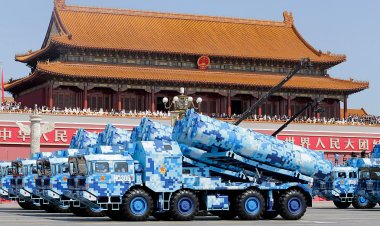The collective threat of China and Pakistan on Indo-Sri Lankan ties
Sri Lanka is one of India's most important neighbours with whom India shares historical, cultural, religious, economic and security links. There is a big possibility for Sri Lanka to have robust relations with China in the future which will push Sri Lanka further away from India’s sphere of influence.
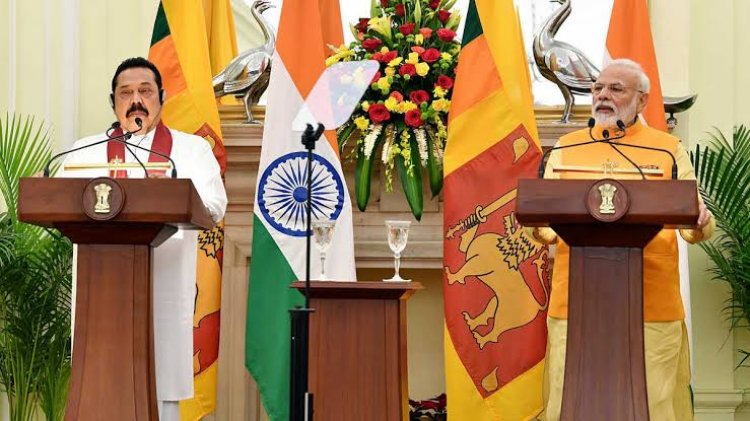
Analysis
By Samiksha Roy
Sri Lanka is one of India's most important neighbours with whom India shares historical, cultural, religious, economic and security links. Both the countries have a free trade agreement with an estimated value of trade being US $ 4.93 billion, India is Sri Lanka's largest trade partner whereas Sri Lanka is the largest trade partner of India among the SAARC countries. They also have robust development cooperation, with India's overall commitment estimated at US $ 3 billion, of which US $ 560 million are grants.
Keeping aside the mutual economic gains, increased connectivity, improving people's lives that these assistance aims to do officially, they are also embedded in the realist purview of conducting foreign policy where it focuses on serving key strategic and security interests. However, in the competitive sphere of international politics where one's interests get coupled against the other, India and Sri Lanka have seen several ups and downs in their relationship, with the recent threat coming from a joint China-Pakistan alliance in the form of china's "strings of pearls" and "debt-trap diplomacy" coupled with developments from Pakistan's Prime Minister recent visit to Colombo which might have long terms implications on India.
The Historic Backdrop:
The civil war in Sri Lanka had a major impact on Indo-Sri Lankan ties and the politics of the respective countries, which continue to haunt the relationship to this date because of the Tamil question. Tamils make up 11.2% of the total population in Sri Lanka. However, even today, after the end of the civil war, they have not been granted proper constitutional rights, and this has been a key concern for India; starting from Rajiv Gandhi to Narendra Modi, they have all talked about safeguarding the rights of Tamils because New Delhi fears that the Tamil nationalist movement in Sri Lanka can arouse similar sentiments in India.
Sri Lanka, on the other hand, has traditionally seen it as an interference in its internal matters, and India's decision to send the IPKF (Indian Peacekeeping force) under the India- Sri Lanka accord to Sri Lanka, which remained there for 30 months made the situation even worse, which essentially turned out to be its own Vietnam moment as India lost around 1200 of its security personnel and 3000 soldiers wounded, eventually carving out the way for the assassination of India's former prime minister Mr. Rajiv Gandhi. The IPKF had to come out of the country without achieving the objective of forging peace between the Sinhalese government and the Tamil minority; instead, New Delhi ended up fighting those very Tamil extremists (LTTE), which it supported earlier. This happened because the Indian leadership at the time, both political and military, did not have an adequate assessment of the situation; their objectives kept changing and therefore had no concrete strategy.
Sri Lanka's relations with Pakistan and China:
The relationship between Sri Lanka and India's traditional adversaries can be characterized as cordial. During the 1971 war, Pakistani jets were re-fuelled in Sri Lanka. Pakistan also provided Sri Lanka with arms and ammunition in its war against LTTE when India stopped providing active defense support to Sri Lanka after it pulled out the IPKF though intelligence sharing remained the same. Unverified reports also show that Pakistan flew bombers over northern Sri Lanka after the war ended. The Sri Lankan military also goes to Pakistan to train. Pakistan is Sri Lanka's second-largest trade partner in South Asia after India; they also have a Free Trade Agreement dating back to 2005 with Pakistan's top exports to Sri Lanka being textiles and cement and Sri Lanka's top exports being Tea, rubber, readymade garments. The domestic dynamics also have a major impact on their relationship.
The Sri Lankan cricket team became a victim of a terror attack in Pakistan in 2009 despite security concerns when they decided to tour Pakistan to help end its isolation in international cricket. Pakistan's High Commissioner to Sri Lanka was also attacked by the LTTE in 2006. Pakistan's warm relations with China helped Sri Lanka to seek financial aid from China and to keep India in check as it developed fear after statements of Indian leaders like Nehru when he proposed an autonomous status for the then Ceylon within India. There has been a steady rise in Chinese investment in Sri Lanka, Chatham house report shows that China invested US $ 12 billion between 2006 and 2019 in Sri Lanka. The case of Colombo port and Hambantota port has already taken the Indian strategic community out of the storm, especially when reports of Chinese submarines docking at the Colombo port came out.
Both China and Sri Lanka have supported each other in international platforms multiple times . In 2014, Chinese president, Mr Xi Jinping visited Sri Lanka, and at that time, Mahinda Rajpaksha, the current prime minister of Sri Lanka held power who is seen as being pro-China.
The recent developments and their consequences:
The Sri Lankan government awarded a US$ 12 million worth contract to a Chinese company named Sinosar-Etechwin to install a Hybrid Renewable Energy System in three islands off the Jaffna coast in Sri Lanka which is 45 km away from Rameshwaram in Tamil Nadu. Though, both Sri Lanka and China have reaffirmed that the company got the contract after participating in a free and fair tender process and after following the ADB (Asian Development Bank) procurement guidelines. MEA has not given a formal statement, but reports suggest that India lodged a strong protest at the project being given to the Chinese. Sri Lanka, in response, added that India's bid was not competitive enough and that it can apply for other projects in the Northern Province. This project can have grave security implications on India considering it will bring the Chinese directly in the vicinity to India's coastline from where they can easily spy on India in particular and the Indian Ocean Region and can make Indian maritime security even more vulnerable, encircling the country from all sides.
India received another setback as Sri Lanka backed out of the proposal to jointly develop the strategic East Coast Terminal (ECT) at the Colombo port with India and Japan, signed during the government of Ranil Wickremesinghe. The project was worth US $ 500-700 million. India previously had control over two-third of trans-shipment at this port, and with Japan already being a major partner in Sri Lanka's development story, having given loans estimated around ¥1.1 trillion and grants and technical cooperation of about ¥300 billion, it was the perfect opportunity to counter BRI and both being members of the QUAD, they could have proved to be an alternate route for providing funding for development projects, especially in South Asia. Suspicion over China's role in the deal's termination remains high because, firstly, other terminal projects in the Colombo port have not faced similar pushbacks. Secondly, when Sri Lanka is under financial distress, it took the step to upset the donors looks problematic. Formally, the decision has been taken to appease the trade union protesters and the Buddhist clergy, but there are chances that foreign forces might have triggered it, and within Sri Lanka, Industrial experts had questioned the decision considering the strategic location of the terminal. From the perspective of international relations, this decision has made Sri Lanka look like an unreliable partner to work with, attracting cold statements from India and Japan. As a balancing act, the Rajapaksha government has offered the West Coast Terminal (WCT) to India and Japan on a Build-Operate-Transfer basis for 35 years but, according to the Hindu, even though they are located at the same port, the WCT has no physical infrastructure and would require more time to become functional.
Pakistan has further added to the complex geopolitical dynamics with the recent visit of Pakistan's Prime Minister to Colombo, where he was given a red carpet and guard of honour welcome. Apart from the usual announcements on enhancing bilateral trade, economic, cultural, and sports cooperation, what attracted strategic observers' attention was Pakistan's invitation to Sri Lanka to use the strategically located Gwadar Port and join the China Pakistan Economic Corridor (CPEC). Sri Lanka also participated in Pakistan's recent Aman exercise; therefore, if Sri Lanka and Pakistan agree to engage under China's influence, especially on security, strategic, infrastructure, and trade matters, it can be detrimental to New Delhi's interest. If Sri Lanka agrees to join CPEC formally, then its stance over the J&K issue will change, considering CPEC goes through POK, so it is bound to have a long-lasting impact on Indo-Sri Lankan ties. CPEC does have a strategic advantage owing to its location and might benefit Colombo’s economic and trade interest but Sri Lanka is not fully independent when it comes to making decisions on strategic matters without taking into consideration power dynamics within the Indian ocean region as mentioned by Srilankan foreign secretary in this recent interview. Since India is Sri Lanka's immediate neighbour, Colombo is unlikely to take such a big decision in a complete disregard of Indian sensibilities. Colombo is likely to adhere to its non-aligned foreign policy, balancing India, Pakistan, and China for the time being.
Imran Khan's visit to Colombo should be seen from the context of Pakistan's initiative to wield its influence over the region and undo India's effort to isolate it. Though not given much attention, the Aman exercise and this visit are a testament that New Delhi's plan to isolate Pakistan, which is reiterated several times, has not been entirely successful. However, Imran Khan’s visit to Colombo cannot be called a resounding victory as he had to face a major embarrassment because his address to the Sri Lankan parliament was cancelled owing to the fear that it might enrage India if he spoke any anti-India rhetoric. This highlights that Pakistan’s obsession with Jammu and Kashmir will always be a barrier in its relationship with other countries, especially those in SAARC like Sri Lanka as they seek to balance both India and Pakistan.
And Finally,
India has been working hard to strengthen its relationship with Sri Lanka and maintains it as a top priority, evident from the recent visits of the national security adviser and External affairs minister to Colombo. However, New Delhi needs to realise that from now on when it engages in South Asia, a region where traditionally, it has held dominance, to continue the same won't be easy as now it has the alliance of China-Pakistan competing against it, with much more vigour and energy, a reflection of which can be seen in the geoeconomics and geopolitical dimensions. Delhi needs to work on the projects that it offers to other countries, making them lucrative as well as fast track both the decision making and the delivery aspect of infrastructure and investment projects; otherwise, another country or institution can take that opportunity, as in the case of Hambantota port, which some reports say was offered to India initially, but now, it's famous for being a Chinese project.
India urgently needs to shorten the bureaucratic process and focus more on delivery and on-ground results because it will become vital in competing with China. Lastly, in the recently conducted vote in UNHRC on a resolution against Sri Lanka, India abstained as a balancing act towards managing both Sri Lanka and Tamil aspirations, more so because the latter is poll bound. Thus, inner dynamics within India further makes it difficult to deal with Sri Lanka and if India’s performance remains the same on matters related to aids, infrastructure development, then there is a big possibility for Sri Lanka to have robust relations with China in the future which will push Sri Lanka further away from India’s sphere of influence.
Samiksha Roy is a Research Assistant with Usanas Foundation
Disclaimer: This paper is the author’s individual scholastic contribution and does not necessarily reflect the organisation’s viewpoint.

